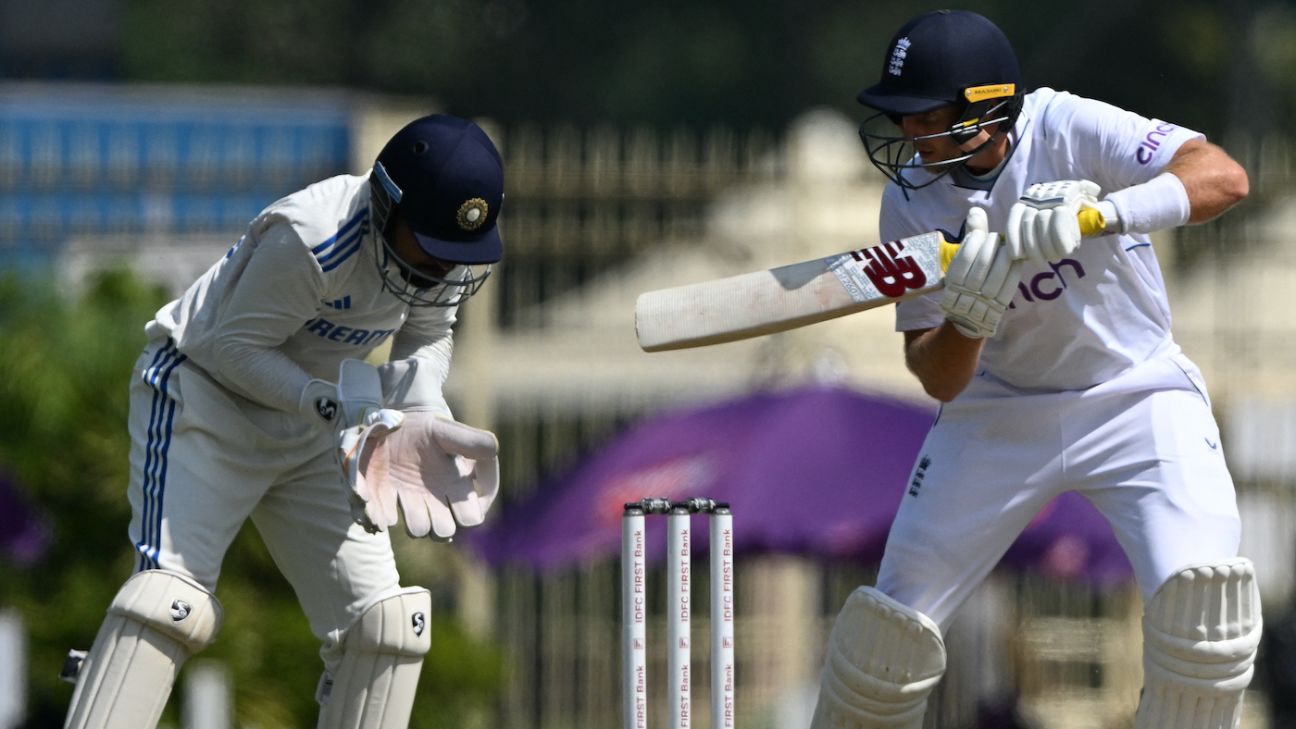[ad_1]
Root reached the close on 106 not out from 226 balls, having compiled his 31st Test century and his first since the opening day of last summer’s Ashes at Edgbaston. It was his sixth century of the so-called Bazball era, but from 219 balls, was also the slowest by any England batter in that period, and the third-slowest of his entire career.
Context, however, was everything for England on a crucial day for their series hopes. After winning the toss and batting first, England’s top-order encountered extravagant seam movement for the new ball, particularly for the debutant quick, Akash Deep, who claimed three wickets in the space of 10 balls. Despite a brace of counterattacking innings from Crawley (42 from 42) and Jonny Bairstow (38 from 35), England were floundering at 112 for 5 when Stokes was trapped lbw by a shooter from Ravindra Jadeja on the stroke of lunch.
Thereafter, however, the conditions eased through the afternoon, and Root found the ideal ally for an old-fashioned rebuild in Ben Foakes, with whom he batted through the entire session, in a 113-run stand for the sixth wicket that spanned 44 overs. Tom Hartley and Ollie Robinson then offered crucial support through to the close, to leave England feeling confident about their chances of bouncing back in the series, having slipped to 2-1 down in Rajkot last week.
Root’s celebrations on reaching his hundred spoke volumes about his determination to come good in this Test, after a previous highest score of 29 in six innings of the series to date, and having copped a significant amount of criticism for his shot selection in Rajkot, where his infamous reverse-scoop against Jasprit Bumrah proved to be the catalyst for India’s fightback with the ball.
On this occasion, he was back to the basics of his game, with a determination to play in the V, and scarcely a cross-batted stroke at any stage of his innings.
“We’re chuffed for him, to be honest,” Crawley said at the close of play. “We never doubted Joe, we just think if he gets couple of lowies, he’s even more due than before, so we fully expected him to go out and get runs in this game. He deserves everything he gets, he works so hard at his game and he always comes good.
“He’s probably the only bloke in our team who could have done that knock; he’s that good, he’s our best player and he’s stepped up when we needed him to,” Crawley added. “We needed him to get a score, and he got a score like he’s done for so many years now. He’s just a phenomenal player, one of the best – if not the best – player we’ve ever had for England.”
Crawley himself had arguably been England’s stand-out batter across the first three Tests, and though his run-a-ball innings was of a very different ilk to Root’s, it was no less crucial in establishing a footnote on a very tricky morning’s batting. He survived a huge slice of luck on 5, when Deep plucked out his off stump with a no-ball, but resolved to take the attack back to India thereafter, with six fours and a six in the remainder of his stay.
“It was nipping a lot and nipping quickly,” Crawley said. “I was trying to bat normally at the start and it was seaming, too difficult. I felt there was one with my name on it. So we had to throw a couple of punches back, and myself and Johnny did that really well actually. Then it got easier, but it was tricky against the spin for the middle-order boys, and they judged that really well. They read the situation and played unbelievably.”
What it means for the match situation remains unclear, given how difficult Ranchi’s cracked, plate-y surface had been to read before the start of the contest. The impression is that the extra hardness of the new ball could be crucial in bringing those cracks into play, while any overnight moisture in the surface could be a factor in the morning session. Crawley, however, said he stood by his assertion at the time of his dismissal, that any score north of 300 would put England “ahead of the game”.
“Against the seam it [was a new-ball pitch] but it got harder versus the spin,” he added. “The softer ball made it bounce a bit more variably. For seam, it was a lot easier by the end, but I think the spin probably got harder.
“It was tricky with the fields they were setting but we just always talk about being present in the moment, playing the situation, and the situation required a bit more caution with that kind of pitch and the variable bounce, and that’s what they delivered.
“At other times, we counter-punched but they played it perfectly and read it well. It was tricky to try and get on top of them with that field, and they just knocked it around and played it perfectly.”
[ad_2]
Source link

